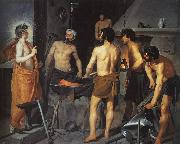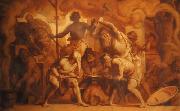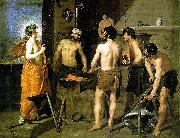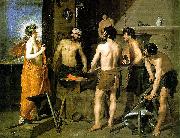Wholesale Oil Painting No Minimum |
|||||||||||
|
|
|||||||||||

|
|||||||||||
|
|
|
||||||||
Diego VelazquezSpanish Baroque Era Painter, 1599-1660 Spanish painter. He was one of the most important European artists of the 17th century, spending his career from 1623 in the service of Philip IV of Spain. His early canvases comprised bodegones and religious paintings, but as a court artist he was largely occupied in executing portraits, while also producing some historical, mythological and further religious works. His painting was deeply affected by the work of Rubens and by Venetian artists, especially Titian, as well as by the experience of two trips (1629-31 and 1649-51) to Italy. Under these joint influences he developed a uniquely personal style characterized by very loose, expressive brushwork. Although he had no immediate followers, he was greatly admired by such later painters as Goya and Manet |
||||||||
|
|
||||||||
The Forge of Vulcan
The Forge of Vulcan Painting ID:: 766 |
1630
Museo del Prado, Madrid 1630 Museo del Prado, Madrid |
|||||||
|
|
||||||||
Luca Giordano1632-1705 Italian Luca Giordano Gallery Charles II of Spain towards 1687 invited him over to Madrid, where he remained for 10 years (1692-1702). In Spain, he produced works for the Royal Palace of Madrid, the Buen Retiro palace, El Escorial, Toledo, and other sites. Giordano was popular at the Spanish court, and the king granted him title as a "caballero". One anecdote of Giordano's speed at painting is that, he was once asked by the Queen of Spain what his wife looked like. On the spot, he painted his wife into the picture before him for the Queen. In Spain he executed numerous works, continuing in the Escorial the series commenced by Cambiasi, and painting frescoes of the Triumphs of the Church, the Genealogy and Life of the Madonna, the stories of Moses, Gideon, David and the Celebrated Women of Scripture, all works of large dimensions. His Dream of Solomon (1693, now at Prado) dates from this period. His pupils, Aniello Rossi and Matteo Pacelli, assisted him in Spain. In Madrid he worked more in oil-colour, a Nativity there being one of his best productions. |
||||||||
|
|
||||||||
|
|
The Forge of Vulcan
The Forge of Vulcan Painting ID:: 34285 |
mk91
Oil on canvas
transferred from a panel
192.5x151.5
mk91 Oil on canvas transferred from a panel 192.5x151.5 |
||||||
|
|
||||||||
Luca Giordano1632-1705 Italian Luca Giordano Gallery Charles II of Spain towards 1687 invited him over to Madrid, where he remained for 10 years (1692-1702). In Spain, he produced works for the Royal Palace of Madrid, the Buen Retiro palace, El Escorial, Toledo, and other sites. Giordano was popular at the Spanish court, and the king granted him title as a "caballero". One anecdote of Giordano's speed at painting is that, he was once asked by the Queen of Spain what his wife looked like. On the spot, he painted his wife into the picture before him for the Queen. In Spain he executed numerous works, continuing in the Escorial the series commenced by Cambiasi, and painting frescoes of the Triumphs of the Church, the Genealogy and Life of the Madonna, the stories of Moses, Gideon, David and the Celebrated Women of Scripture, all works of large dimensions. His Dream of Solomon (1693, now at Prado) dates from this period. His pupils, Aniello Rossi and Matteo Pacelli, assisted him in Spain. In Madrid he worked more in oil-colour, a Nativity there being one of his best productions. |
||||||||
|
|
||||||||
|
|
The Forge of Vulcan
The Forge of Vulcan Painting ID:: 41012 |
mk159
Oil on canvas
transferred from panel
192.5x151.5cm
mk159 Oil on canvas transferred from panel 192.5x151.5cm |
||||||
|
|
||||||||
Ernst Sigismund Kirchbachpainted The Forge of Vulcan in between 1869 and 1875 |
||||||||
|
|
||||||||
|
|
The Forge of Vulcan
The Forge of Vulcan Painting ID:: 80914 |
between 1869 and 1875
English: Oil on canvas
Dimensions 58 x 81 cm (22.8 x 31.9 in)
cjr between 1869 and 1875 English: Oil on canvas Dimensions 58 x 81 cm (22.8 x 31.9 in) cjr |
||||||
|
|
||||||||
Diego VelazquezSpanish Baroque Era Painter, 1599-1660 Spanish painter. He was one of the most important European artists of the 17th century, spending his career from 1623 in the service of Philip IV of Spain. His early canvases comprised bodegones and religious paintings, but as a court artist he was largely occupied in executing portraits, while also producing some historical, mythological and further religious works. His painting was deeply affected by the work of Rubens and by Venetian artists, especially Titian, as well as by the experience of two trips (1629-31 and 1649-51) to Italy. Under these joint influences he developed a uniquely personal style characterized by very loose, expressive brushwork. Although he had no immediate followers, he was greatly admired by such later painters as Goya and Manet |
||||||||
|
|
||||||||
|
|
The Forge of Vulcan
The Forge of Vulcan Painting ID:: 81515 |
Medium Oil on canvas
Dimensions 223 x 290 mm (8.78 x 11.42 in)
cjr Medium Oil on canvas Dimensions 223 x 290 mm (8.78 x 11.42 in) cjr |
||||||
|
|
||||||||
Diego VelazquezSpanish Baroque Era Painter, 1599-1660 Spanish painter. He was one of the most important European artists of the 17th century, spending his career from 1623 in the service of Philip IV of Spain. His early canvases comprised bodegones and religious paintings, but as a court artist he was largely occupied in executing portraits, while also producing some historical, mythological and further religious works. His painting was deeply affected by the work of Rubens and by Venetian artists, especially Titian, as well as by the experience of two trips (1629-31 and 1649-51) to Italy. Under these joint influences he developed a uniquely personal style characterized by very loose, expressive brushwork. Although he had no immediate followers, he was greatly admired by such later painters as Goya and Manet |
||||||||
|
|
||||||||
|
|
The Forge of Vulcan
The Forge of Vulcan Painting ID:: 85521 |
Oil on canvas
Dimensions 223 x 290 mm (8.78 x 11.42 in)
cyf Oil on canvas Dimensions 223 x 290 mm (8.78 x 11.42 in) cyf |
||||||
|
|
||||||||
|
Diego Velazquez Spanish Baroque Era Painter, 1599-1660 Spanish painter. He was one of the most important European artists of the 17th century, spending his career from 1623 in the service of Philip IV of Spain. His early canvases comprised bodegones and religious paintings, but as a court artist he was largely occupied in executing portraits, while also producing some historical, mythological and further religious works. His painting was deeply affected by the work of Rubens and by Venetian artists, especially Titian, as well as by the experience of two trips (1629-31 and 1649-51) to Italy. Under these joint influences he developed a uniquely personal style characterized by very loose, expressive brushwork. Although he had no immediate followers, he was greatly admired by such later painters as Goya and Manet The Forge of Vulcan Oil on canvas Dimensions 223 x 290 mm (8.78 x 11.42 in) cyf |
||||||||
|
|
||||||||
|
Prev Next
|
||||||||
|
|
||||||||
|
Related Paintings to Diego Velazquez :. |
||||||||
|
|
||||||||
|
CONTACT US |






